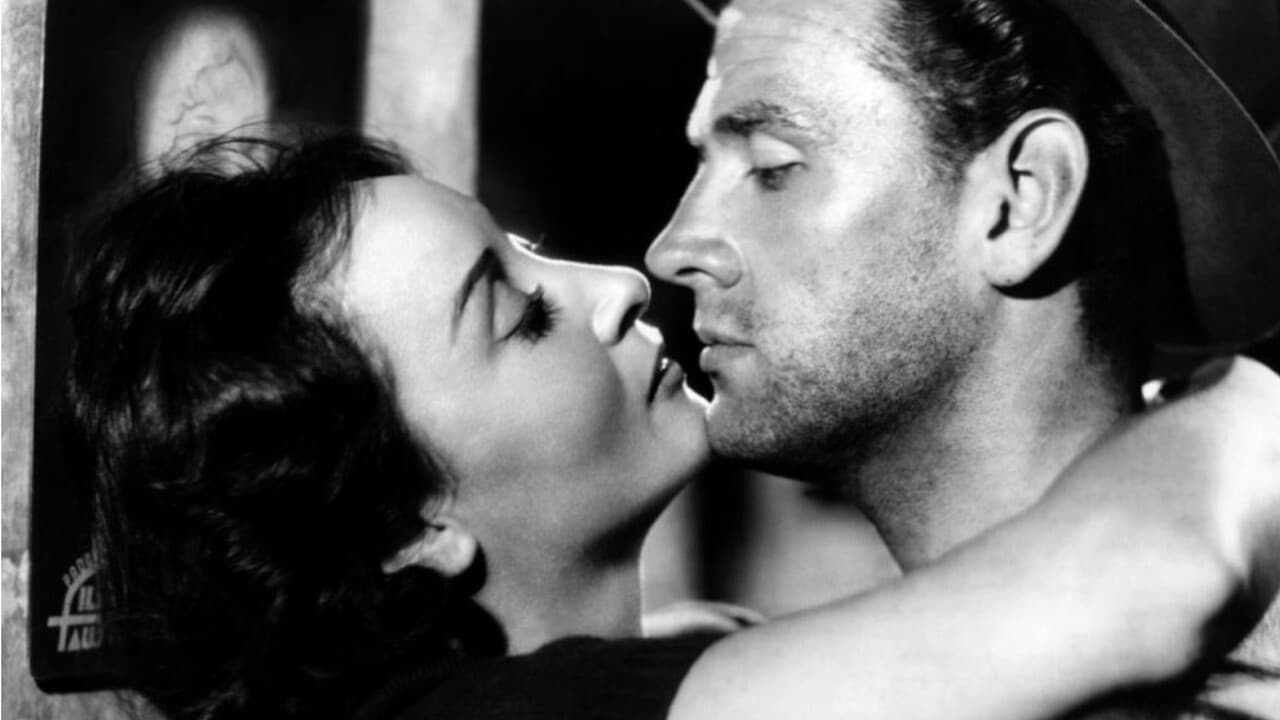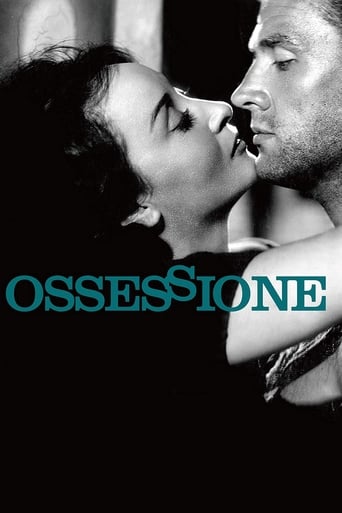

Wonderfully offbeat film!
... View MoreA Major Disappointment
... View MoreMostly, the movie is committed to the value of a good time.
... View MoreGreat movie. Not sure what people expected but I found it highly entertaining.
... View MoreA double-bill of two vintage films adapted from James M. Cain's 1934 novel THE POSTMAN ALWAYS RING TWICE, 1946's Hollywood B&W version and Visconti's groundbreaking debut in 1943, while intentionally evade the less-championed 1981 remake with Nicholson and Lange. The 1946 film, directed by the prolific journeyman Tay Garnett, is a less riveting Film-Noir compared to Billy Wilder's DOUBLE INDEMNITY (1944, 8/10), virulently extends the mismatch of the married couple Cora and Nick by casting the stunning beauty Lana Turner and the nondescript good fellow Cecil Kellaway, bar the gaping age difference, they don't belong together in any universe. The interloper is the shifty-looking drifter Frank (John Garfield), the unscrupulousness is all on his face, and driven by lust he falls for her at the first sight. But as the code of this specific genre, the evil thrust is almost inclusively kick-started by the female-fatale, "I wanna be somebody!", as Cora contests, she is stuck in a miasma and Frank is the last straw. As the title suggests, there are two attempts of murder (poor Nick), after a botched first one, in order to facilitate the second one, the film hastily piles up all the stimulus, including a horrid one when Nick decides to wrap up their business and move back to his hometown in Canada, and wait for the worst part, Cora will be coerced to attend to Nick's bed-ridden sister. Nick must die, there is just no other way around. It is a cheap shot. After a fine touch with echoes, Nick is dispatched successfully, then the film spirals with its poorly contrived script including the cringe-making mediation of the justice system and the worst double-cross scam from the DA Mr. Sackett (Ames), who has been ominously introduced in the very beginning of the film. Yet, we must buy it and the two get away with the murder. (An honorable mention to Hume Cronyn's remarkable impersonation as the vile attorney). But wrongdoers can never be spared in the mainstream media at then, unexpectedly, one almost steps into the trap of a bolder and more wicked twist when they return to the beach and swim to their strength's extremity, however, it is only a bluff, the ending is more self-righteous and insignificantly self-serving. Right near the opening scenes, the glaring fake backgrounds almost haul me out of the context, some oldies are simply can not be taken too seriously with today's standards, thankfully, Lana Turner can pacify the sketchy slackness with her engrossing portrait of a woman at the end of her tether, she is good, but not in the same league as Stanwyck's excellence. By comparison OBSESSION, made 3 years before the Hollywood version, is an audacious maiden work which injects tremendous pathos into its two main roles with strenuous character- dissections assisted by onerous fieldwork. Visconti ditched its original title and transposed the story in a village near Ancona with authentic settings, an accepted trailblazer of Neorealismo movement and a tour-de-force of chiaroscuro finesse. A thirty-some Giovanna (Calamai) is the wife of a trattoria owner Giuseppe (the opera chanting Juan de Landa), distressed by Giuseppe's negligence and ill-treatment and disgusted by his obesity, her passion is instantaneously ignited when she meets Gino (a masculine-built and smoldering hot Girotti), a diddling young tramp in his 20s, they sleep together the very afternoon of the day, with a ballsy nuance, the advances are in fact instigated from the female part. For Gino, a mature and attractive woman is like an oasis in the desert, but he is much wiser (and more sensible) than Frank, when Giovanna bails on their elopement, he has the balls to leave her for good, gets going on with his fellow itinerant Lo Spagnolo "The Spanish" (a prematurely- deceased Elio Marcuzzo), this interlude is not in the novel, but Visconti never miss a chance to enhance the ambiguous rapport between men, and here, it has been teased out brilliantly with the side-by-side sitting which will appear again with a different undercurrent. But destiny has its own plans, Gino reunites with Giuseppe and Giovanna during a festival, and this time he has no strength to resist the temptation, after the festive cacophony, including a jolly episode of Giuseppe contests in a singing competition, en route to their trattoria, out of an act of passion, they fake a road accident and Giuseppe is killed. After that, without the distracting offshoots of courtroom drama and the conceited detectives or snooty lawyers, the film fixates on the aftermath where they have to live on with the consequences of their unforgivable deeds, especially for Gino, he is not the type of person who can hatch a murder scheme, he is seductive but never lethal. Yet, his love for Giovanna is too intense and it overpowers his soundness of judgment, Girotti proves he is not just a burly stallion, unlike Garfield, Gino's psychological fluctuations are potently presented, and his fling with a plain-looking prostitute Anita (Cristiani) indicates his unsophisticated nature.As for Giovanna, she is an ordinary wife who needs to break out her mundane life with a man she doesn't love, at the same time, she is afraid of uncertainty, especially under the WWII backwater, she should be content but she couldn't, especially when lust presides. Calamai is less glamorous but more impressive to exert her conversion from a sulky, manipulative housewife to a vulnerable and pitiful captive for the man she wholeheartedly loves. Their reconciliation is genuinely touching and the abrupt ending is much more plaintive and sob-inducing. There is alway a mixed feeling after a double bill because you cannot love or hate them equally, confessionally, Visconti's debut would not be so exceptional if I had not watched the Hollywood adaptation beforehand, peer comparison does have its direct effect, I should try it more often.
... View MoreIn this unauthorized adaptation of James Cain's "The Postman Always Rings Twice," a drifter falls for the wife of the owner of a roadside inn and the two plot to murder him. While the 1946 Hollywood version of the book wisely focuses on the lovers, this Italian version includes subplots involving the drifter's friends that make it drag and go on much too long. Not helping matters is the poor quality of the print, which comes from Visconti himself after the original negative was destroyed. The flickering images make it look more like a silent film than one made in 1943. This is not a bad directorial debut for Visconti, but his screenplay is not only plagiarized but rambling.
... View MoreFirst thing to bear in mind is that it is the second version of Cain 's "Postman always rings twice" .The first version was French and made in 1939 by Pierre Chenal with satisfying -but not outstanding -results.Two American Versions were to follow Visconti's ,Tay Garnett's film starring John Garfield and Lana Turner being the best of the two ,in spite of Jack Nicholson's and Jessica Lange's talent.Luchino Visconti's "ossessione" beats them all.It features the best tramp,Massimo Girotti ,although John Garfield is a close second.Unlike the three other movies,it's not really a thriller,it's rather a psychological drama where James Cain's story often sounds as if it had been rewritten by Patricia Highsmith -which the presence of the gay Spanish man reinforces-.The lack of of picturesque in the depiction of Italian life predates Neorealism which officially began just after the war.Unlike Chenal's and Garnett's works ,you will not find here any suspense:the "accident" does not interest the director at all;nor the investigation.The movie deals with Gino's obsession :first his desire for Giovanna ,then with his remorse when he hears and sees his victim everywhere in the house.It also depicts Giovanna 's obsession: to live her passionate love while staying a respectable lady ,to stop being "invited by men";and to a lesser degree Lo Spagnolo's : in a very short scene ,he lights a cigarette and his match lights Gino's body."Ossessione" is a masterpiece of Italy's fascist years,at a time this country did not produce many great works.They say it shocked a lot of people.
... View MoreWell, I'd heard from somewhere that Ossessione is a precursor to the Italian film genre, and particular favourite of mine, the 'Giallo'...but actually, aside from the fact that this is a thriller that was made in Italy; the two have pretty much no relation. In the sixties and seventies, Italian film-makers would get themselves a reputation for ripping off just about every successful American film released. They've not done that here, but Ossessione does follow almost the exact same story as the later American film 'The Postman Always Rings Twice', without giving the book's author, James M. Cain, so much as a credit! Anyway, the plot focuses on Gino Costa, a handsome drifter who, by chance, stumbles upon a café where a woman named Giovanna Bragana works. He soon learns that she's married to Giuseppe; a big fat annoying man, whom Giovanna can't stand to have even touching her. He wants the pair of them to run away together, but she's not so keen on the idea. However, fate ends up intervening and her plan to have her husband murdered is successful...Despite the fact that the film loses some credibility for not crediting the author whose story it's based on, it has to be said that director Luchino Visconti implements the film noir style well, and in a way I even prefer the atmosphere of this film to some of the bigger American noir classics. The story is, as you would expect, extremely strong and the Visconti manages to pull good performances out of his cast. Visconti drags the film out a little bit too much, however, and with a running time of almost 135 minutes, I felt that the story was too thin to warrant this kind of length. I almost feel guilty for levelling all this criticism at Ossessione as it IS a good film, but it's not a 'great' film. The relationship between the two central characters is never really explored properly, and it seems like the film is keener to distract us from it rather than let us into the characters' heads. There's not much mystery to the plot as we pretty much always know what's going on, and by not always focusing on the characters themselves; the film is not as interesting as it could have been. Still, it makes for an interesting viewing and comes recommended for that reason...although it's not as good as the 1946 version of the same James M. Cain classic.
... View More